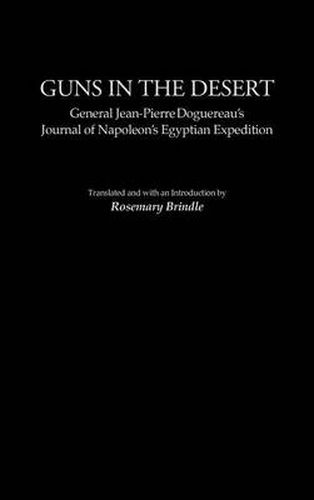Readings Newsletter
Become a Readings Member to make your shopping experience even easier.
Sign in or sign up for free!
You’re not far away from qualifying for FREE standard shipping within Australia
You’ve qualified for FREE standard shipping within Australia
The cart is loading…






This lively, firsthand account of an army trapped in a hostile land, cut off from reinforcement and facing powerful enemies, is offered in English for the first time. As an active artillery officer, Jean-Pierre Doguereau was present at most of the major battles and sieges of the campaign. He suffered the hardships and disappointments and experienced the triumphs and hopes of the courageous, but ultimately doomed, Army of the Orient. While essentially the account of a professional soldier, the journal also details Doguereau’s wonder and reflections on the invaded country and its people, so different from the land he and his comrades had expected.
As the memoir of a junior staff officer, albeit one who later rose to high rank, this account gives a view from the discomfort of the bivouac. Doguereau details the taking of El Arich and the murder of the garrison at Jaffa, the failure of the assault on Acre, then the terrible march of the plague-stricken French Army back to Cairo. After Napoleon departs for France, the struggle continues against the rising opposition of the Turks. Doguereau writes with an air of great honesty in a style that avoids self-glorification. This translation should interest all students of the period and all who study the reactions of human beings under stress.
$9.00 standard shipping within Australia
FREE standard shipping within Australia for orders over $100.00
Express & International shipping calculated at checkout
This lively, firsthand account of an army trapped in a hostile land, cut off from reinforcement and facing powerful enemies, is offered in English for the first time. As an active artillery officer, Jean-Pierre Doguereau was present at most of the major battles and sieges of the campaign. He suffered the hardships and disappointments and experienced the triumphs and hopes of the courageous, but ultimately doomed, Army of the Orient. While essentially the account of a professional soldier, the journal also details Doguereau’s wonder and reflections on the invaded country and its people, so different from the land he and his comrades had expected.
As the memoir of a junior staff officer, albeit one who later rose to high rank, this account gives a view from the discomfort of the bivouac. Doguereau details the taking of El Arich and the murder of the garrison at Jaffa, the failure of the assault on Acre, then the terrible march of the plague-stricken French Army back to Cairo. After Napoleon departs for France, the struggle continues against the rising opposition of the Turks. Doguereau writes with an air of great honesty in a style that avoids self-glorification. This translation should interest all students of the period and all who study the reactions of human beings under stress.